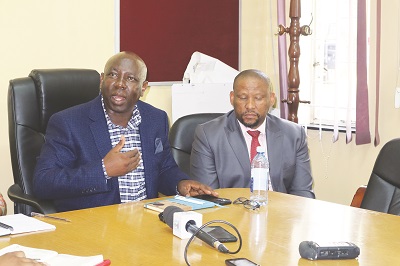By: Mpho Shelile
The Minister of Agriculture, Food Security and Nutrition Hon. Thabo Mofosi at a press conference held in Maseru on Thursday, confirmed that borders will open on Friday for fertile eggs and frozen Chicken from South Africa (SA).
He indicated that the government has been working tirelessly to ensure that Basotho farmers get fertilized eggs and chicks, stating that eggs are the only safe products they can import from South Africa after research and tests have proven that eggs cannot get infected therefore it is safe for Lesotho to import them from S.A. The Ministry and its South African counterparts will select areas where the above-mentioned poultry products will be bought.
Hon. Mofosi stated that they have identified suppliers who will sell chicken to Lesotho together with their counterpart S.A. An agreement to choose safe places which will supply frozen chicken meat and fertilized eggs to Lesotho comes from a suspicion that Avian influenza still exists in S.A and that almost every Mosotho needs chicken and/or eggs for daily consumption, hence they had to put together a task team investigating where Basotho can purchase eggs and chicks without flu. The government of South Africa will provide approved documentation which will ensure the safety of consumption of those chickens.
Moreover, Hon. Mofosi emphasized that only frozen meat and fertile eggs which have undertaken necessary tests will be imported into the country, adding that he believes that it is very risky to import frozen chicken from S.A, however, he indicated that the government of Lesotho will see to it that poultry farmers get chicken from other countries with prices they are used to purchasing in S.A by meeting them halfway with the subsidized amount. In a statement, the Department of Agriculture said the government had facilitated increased imports of eggs, fertilized eggs, and frozen chicken from Zambia, Eswatini, and Zimbabwe to ensure that Basotho farmers get them in order to be able to continue with their businesses and supply Basotho with the chicken they need.
He then clarified that the government is not purchasing this chickens for farmers but meeting them halfway in terms of purchase price since importing chicken from the three mentioned countries will be slightly more costly than importing from South Africa, stating that farmers need to know that the growth of chickens within a country is not just about poultry farming, it is about fostering economic development, ensuring food security, and promoting sustainable agricultural practices.
He believes that by recognizing the multifaceted benefits of a robust domestic chicken farming sector, Lesotho can work towards creating a resilient and self-sufficient food system that serves the well-being of both the population and the economy so they can export more than import.
The Veterinarians doctors from the Ministry of Agriculture and Food Security; Dr. Keneuoe Lehloenya, indicated that the poultry industry requires significant capital investment in key facilities, and access to essential intellectual property in terms of the leading breeds, coupled with the necessary production facilities at each level of the value chain, through to processing and packaging. She also stated that their trip to Eswatini has inspired them to come back and equip local farmers with what they have learned, “Eswatini does not import chicken, meaning they have a sustainable poultry industry, the only thing they import is fertilized eggs from South Africa,” said Dr. Keneuoe.
Dr. Keneuoe said that chicken farming especially parent stock plays a crucial role in the economic and nutritional well-being of a country adding that poultry parent stock farming is essential for the genetic improvement of commercial poultry flocks, ensuring their adaptability, efficiency, and sustainability. “The success of the poultry industry relies on continuous advancements in breeding programs to meet the growing demand for poultry products worldwide,” said Dr. Keneuoe. She added that they know that parent stock farming is very difficult, so they are going to start educating farmers on taking care of such. She also said that they have put together money which will be utilized to educate Basotho farmers on becoming better poultry farmers.
Further stating that poultry parent stock breeding programs are designed to meet the evolving demands of the market. Which include producing birds that align with consumer preferences, industry standards, and regulatory requirements. Breeding programs that focus on traits like feed efficiency and resource utilization contribute to the overall sustainability of the poultry industry. “By producing more with less, poultry farming can reduce its environmental footprint, and with all the education our farmers will be getting, the Lesotho poultry industry is to be sustainable.”


